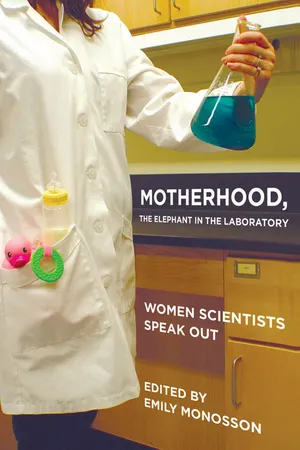
- English
- ePUB (mobile friendly)
- Available on iOS & Android
About this book
About half of the undergraduate and roughly 40 percent of graduate degree recipients in science and engineering are women. As increasing numbers of these women pursue research careers in science, many who choose to have children discover the unique difficulties of balancing a professional life in these highly competitive (and often male-dominated) fields with the demands of motherhood. Although this issue directly affects the career advancement of women scientists, it is rarely discussed as a professional concern, leaving individuals to face the dilemma on their own.
To address this obvious but unacknowledged crisis—the elephant in the laboratory, according to one scientist—Emily Monosson, an independent toxicologist, has brought together 34 women scientists from overlapping generations and several fields of research—including physics, chemistry, geography, paleontology, and ecology, among others—to share their experiences.
From women who began their careers in the 1970s and brought their newborns to work, breastfeeding them under ponchos, to graduate students today, the authors of the candid essays written for this groundbreaking volume reveal a range of career choices: the authors work part-time and full-time; they opt out and then opt back in; they become entrepreneurs and job share; they teach high school and have achieved tenure.
The personal stories that comprise Motherhood, the Elephant in the Laboratory not only show the many ways in which women can successfully combine motherhood and a career in science but also address and redefine what it means to be a successful scientist. These valuable narratives encourage institutions of higher education and scientific research to accommodate the needs of scientists who decide to have children.
Contributors: A. Pia Abola, biochemist, writer, and editor; Caroline (Cal) Baier-Anderson, University of Maryland, Baltimore; Joan S. Baizer, SUNY Buffalo; Stefi Baum, Rochester Institute of Technology; Aviva Brecher, U.S. Department of Transportation, Volpe Center (Cambridge, Massachusetts); Teresa Capone Cook, American Heritage Academy; Carol B. de Wet, Franklin & Marshall College; Kimberly D'Anna, University of Wisconsin–Madison; Anne Douglass, NASA Goddard Space Flight Center; Elizabeth Douglass, Scripps Institute of Oceanography; Katherine Douglass, George Washington University; Deborah Duffy, University of Pennsylvania; Rebecca A. Efroymson, U.S. government research laboratory; Suzanne Epstein, Food and Drug Administration; Kim M. Fowler, Pacific Northwest National Laboratory; Debra Hanneman, Whitehall Geogroup, Inc. and Earthmaps.com; Deborah Harris, Fermi National Accelerator Laboratory; Andrea L. Kalfoglou, University of Maryland, Baltimore County; Marla S. McIntosh, University of Maryland; Marilyn Wilkey Merritt, George Washington University; Emily Monosson, toxicologist and writer; Heidi Newberg, Rensselaer Polytechnic Institute; Rachel Obbard, British Antarctic Survey; Catherine O'Riordan, Consortium for Ocean Leadership; Nanette J. Pazdernik, independent author and molecular biologist; Devin Reese, National Science Resources Center; Marie Remiker (pseudonym); Deborah Ross, Indiana University-Purdue University Fort Wayne; Christine Seroogy, University of Wisconsin–Madison; Marguerite Toscano, independent geoscientist, writer, and editor; Gina D. Wesley-Hunt, Montgomery College; Theresa M. Wizemann, Merck & Co., Inc.; Sofia Refetoff Zahed, University of Wisconsin-Madison; Gayle Barbin Zydlewski, Cove Brook Watershed Council and University of Maine
Frequently asked questions
- Essential is ideal for learners and professionals who enjoy exploring a wide range of subjects. Access the Essential Library with 800,000+ trusted titles and best-sellers across business, personal growth, and the humanities. Includes unlimited reading time and Standard Read Aloud voice.
- Complete: Perfect for advanced learners and researchers needing full, unrestricted access. Unlock 1.4M+ books across hundreds of subjects, including academic and specialized titles. The Complete Plan also includes advanced features like Premium Read Aloud and Research Assistant.
Please note we cannot support devices running on iOS 13 and Android 7 or earlier. Learn more about using the app.
Information
Table of contents
- Acknowledgments
- Introduction
- Section I. 1970s
- Section II. 1980s
- Section III. 1990s
- Section IV. 2000s
- Conclusion
- Contributors